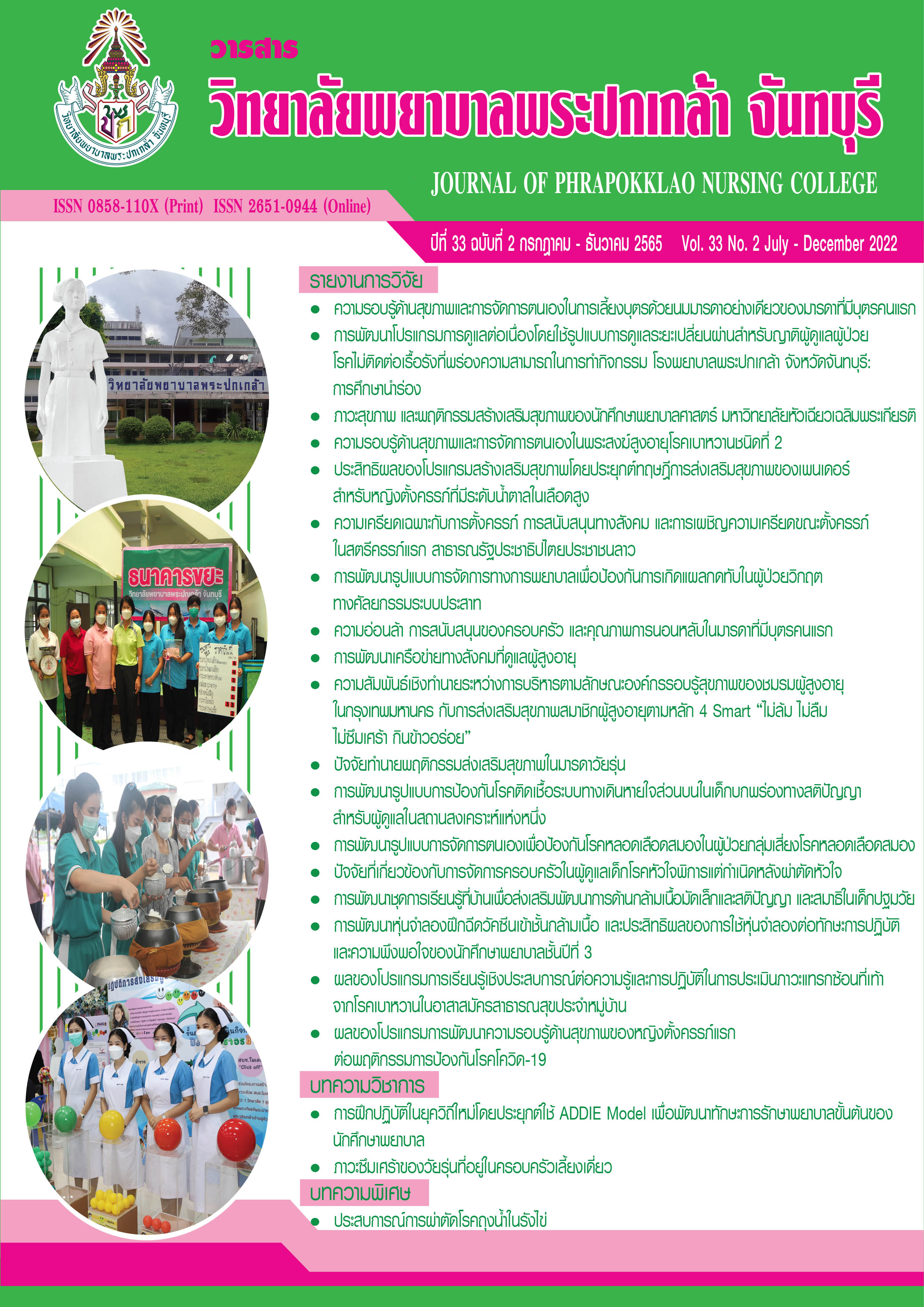Pregnancy-specific Stress, Social Support, and Prenatal Coping among Primigravid Women, the Lao People’s Democratic Republic
Keywords:
Pregnancy-specific stress, Social support, Prenatal coping, Primigravid womenAbstract
This descriptive correlational research aimed to explore the relationships of pregnancy-specific stress, social support, and prenatal coping among primigravid women. The samples consisted of 85 primigravid women who received antenatal care at the Maternal and Newborn Hospital, Vientiane Province, the Lao People's Democratic Republic. The research instruments included the demographic data questionnaire, the pregnancy-specific stress questionnaire with reliability of .82, the social support questionnaire with reliability of .92, and the prenatal coping questionnaire with reliability of .93. Data were collected from May to July, 2020. Statistics used for data analysis included frequency, percentage, mean, standard deviation, and Pearson’s product moment correlation.
The research results revealed that the primigravid women demonstrated overall mean score of prenatal coping at a moderate level (M = 69.65, SD = 14.41). Pregnancy-specific stress and social support were positively statistically significantly related to prenatal coping among primigravid women (r = .282, p < .01 and r = .652, p < .001, respectively).
This research suggests that the nurse-midwives should promote prenatal coping among primigravid women by considering pregnancy-specific stress and social support factors for better health outcomes of both pregnant women and their fetuses.
References
จิราวรรณ นิรมิตภาษ. (2551). ปัจจัยส่วนบุคคล ความรู้สึกมีคุณค่าในตนเอง แรงสนับสนุนทางสังคม และการปรับตัวด้านจิตสังคมของสตรีตั้งครรภ์ที่อายุมาก (วิทยานิพนธ์ปริญญามหาบัณฑิต). กรุงเทพฯ: มหาวิทยาลัยมหิดล.
นันทกา สวัสดิพานิช, และสุจิตรา เทียนสวัสดิ์. (2554). การแปลเครื่องมือเพื่อใช้ในงานวิจัยข้ามวัฒนธรรม: เทคนิคและประเด็นที่ต้องพิจารณา. วารสารสภาการพยาบาล, 26(1), 19–28.
รุ่งนภา โพธิ์แสน, จันทรรัตน์ เจริญสันติ, และบังอร ศุภวิทิตพัฒนา. (2562). ความเครียดที่เฉพาะกับการตั้งครรภ์ การสนับสนุนทางสังคม และการเผชิญความเครียดในสตรีที่เป็นเบาหวานขณะตั้งครรภ์. วารสารวิทยาลัยพยาบาลบรมราชชนนี กรุงเทพ, 35(1), 59–70.
สุกัญญา ม่วงเลี้ยง, ฉวี เบาทรวง, และนันทพร แสนศิริพันธ์. (2562). ความรู้สึกไม่แน่นอนและการเผชิญความเครียดในสตรีตั้งครรภ์ช่วงรอผลวินิจฉัยการเจาะน้ำคร่ำ. วารสารวิทยาลัยพยาบาลบรมราชชนนี อุตรดิตถ์, 11(1), 181–196.
Alderdice, F., & Lynn, F. (2009). Stress in pregnancy: Identifying and supporting women. British Journal of Midwifery, 17(9), 552–559. doi:10.12968/bjom.2009.17.9.43787
Borcherding, K. E. (2009). Coping in healthy primigravidae pregnant women. Journal of Obstetric, Gynecologic, and Neonatal Nursing, 38(4), 453–462. doi:10.1111/j.1552-6909.2009.01041.x
Cohen, S., & Wills, T. A. (1985). Stress, social support, and the buffering hypothesis. Psychological Bulletin, 98(2), 310–357. doi:10.1037/0033-2909.98.2.310
Giurgescu, C., Penckofer, S., Maurer, M. C., & Bryant, F. B. (2006). Impact of uncertainly, social support, and prenatal coping on the psychological well-being of high-risk pregnant woman. Nursing Research, 55(5), 356–365. doi:10.1097/00006199-200609000-00008
Hamilton, J. G., & Lobel, M. (2008). Types, patterns, and predictors of coping with stress during pregnancy: Examination of the Revised Prenatal Coping Inventory in a diverse sample. Journal of Psychosomatic Obstetrics & Gynecology, 29(2), 97–104. doi:10.1080/01674820701690624
House, J. S. (1981). Work stress and social support. Reading, MA: Addison-Wesley.
Huizink, A. C., de Medina, P. G., Mulder, E. J., Visser, G. H., & Buitelaar, J. K. (2002). Coping in normal pregnancy. Annals of Behavioral Medicine, 24(2), 132–140. doi:10.1207/s15324796abm2402_10
Lazarus, R. S., & Folkman, S. (1984). Stress, appraisal, and coping. New York: Springer.
Lederman, R., & Weis, K. (2009). Psychosocial adaptation to pregnancy: Seven dimensions of maternal role development (3rd ed.). New York: Springer.
Lobel, M., Cannella, D. L., Graham, J. E., DeVincent, C., Schneider, J., & Meyer, B. A. (2008). Pregnancy-specific stress, prenatal health behaviors, and birth outcomes. Health Psychology, 27(5), 604–615. doi:10.1037/a0013242
Polit, D. F., & Beck, C. T. (2017). Nursing research: Generating and assessing evidence for nursing practice (10th ed.). Philadelphia, PA: Wolters Kluwer Health.
Rieger, K. L., & Heaman, M. I. (2016). Factors associated with high levels of perceived prenatal stress among inner-city women. Journal of Obstetric, Gynecologic, and Neonatal Nursing, 45(2), 180–195. doi:10.1016/j.jognn.20 15.12.005
Thoits, P. A. (1982). Conceptual, methodological, and theoretical problems in studying social support as a buffer against life stress. Journal of Health and Social Behavior, 23(2), 145–159.
Yali, A. M., & Lobel, M. (1999). Coping and distress in pregnancy: An investigation of medically high risk women. Journal of Psychosomatic Obstetrics & Gynecology, 20(1), 39–52. doi:10.3109/01674829909075575
Downloads
Published
How to Cite
Issue
Section
License
Copyright (c) 2022 JOURNAL OF PHRAPOKKLAO NURSING COLLEGE

This work is licensed under a Creative Commons Attribution-NonCommercial-NoDerivatives 4.0 International License.
เนื้อความ ข้อมูล และรายการอ้างอิงที่ผู้เขียนใช้ในการเขียนบทความเพื่อลงตีพิมพ์ในวารสารวิทยาลัยพยาบาลพระปกเกล้า จันทบุรี ถือเป็นความคิดเห็นและความรับผิดชอบของผู้เขียน คณะผู้จัดทำวารสารไม่จำเป็นต้องเห็นพ้องด้วยหรือร่วมรับผิดชอบ
บทความที่ได้รับการลงตีพิมพ์ในวารสารวิทยาลัยพยาบาลพระปกเกล้า จันทบุรี ถือเป็นลิขสิทธิ์ของวารสารวิทยาลัยพยาบาลพระปกเกล้า จันทบุรี หากหน่วยงานหรือบุคคลใดต้องการนำส่วนหนึ่งหรือทั้งหมดของบทความไปเผยแพร่ต่อเพื่อวัตถุประสงค์ใด ๆ จะต้องได้รับอนุญาตจากบรรณาธิการวารสารก่อน



